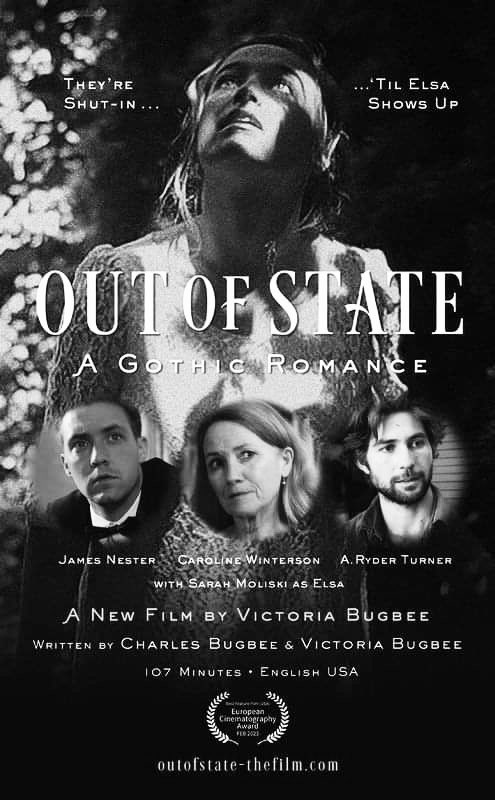
-Who is Victoria Bugbee?
I’m an award winning filmmaker, playwright and visual artist who lives outside of New York City.. “Out of State-A Gothic Romance” is my first feature film that I filmed in my old Victorian house. My family is very important to me and my first film is about The Garth Family, a very dysfunctional one. Trained as a visual artist, I created experimental audience immersive performance staged everyday places – an auto body shop, a laundromat, a furniture store window and an urban parking lot. Plays include “Murder at Le Pavillion Hotel,” “The Vacation-Worlds of Desperation,” “Boxer Shorts.” “Life & Death With Business In Between”began as a series of mural size pastels, then a performance and it is now a surreal musical.
I received a commission from Creative Time and Lincoln Center to create “A Surreal Soap Opera-Toxic Waste Meets Beach Resort,” an audience immersive black comedy about climate crisis. Videotaping the performances lead to a career in commercial film & fashion videos for New York Fashion Week, Oscar de la Renta, Vogue, CBS, STARZ, GQ and more.
Currently, I am adapting my play “The Gas Station Project” into a feature film. With cars as metaphor all the world’s a showcase. It deals with a young couple who own an automotive center in rural Florida. Their crumbling marriage is told through their eyes, their children and their best friends.

-What inspired you to become a filmmaker?
Trained as a visual artist,I wanted my drawings to leap off the paper and found my ability to visualize and tell stories as a filmmaker. I was always surrounded by art, theater and movies.There was a little movie theater down the street from our house. Every Saturday they showed a double feature and my sister and brothers would spend every afternoon there watching everything from Disney, to horror to big Hollywood Westerns andBiblical movies. My parents took a car load of kids to the drive-ins. As teenagers we’d go into the movie houses that showed European films and I was captivated by the different sensibility, language of filmmaking. As an art student living in Argentina, heaven was sitting on folding chairs, drinking coffee and smoking while taking in Polanski tales, Fellini masterpieces and Bergman’s psychological dramas.
-Do you think cinema can change the world?
Cinema is a very powerful tool that change change the world. Well crafted moving image combined with words, music and brilliant editing can stir deep emotional responses in the viewer. Take for example Spiieberg’s “Schnidler’s List” it prompted people to say “Never Again.” Recent movies like “Fancy Dance” a new film by Erica Tremblay focused on the plight of Native American Indian women who have gone missing with police turn a blind eye to their plight. Conversely, uplighting films give people hope for the future.

-What would you change in the world?
The violence, hate, bloodshed and one nation or ideology trying to take over another country or ethnic group is unsustainable. We need to strive for peace. At the same time climate crisis is unsustainable. This has to be a global effort to change the path of climate warming if we are to survive. I wrote “A Surreal Soap Opera-Toxic Waste Meets Beach Resort” over 30 years ago. In the play dead birds fall out of the sky, heaps of trash thrown from the audience litters the stage and a toxic green gas kills all the players. It was surreal but now this is reality. For if the surreal exits within the mind, reality lies outside.
-Where do you see the film industry going in the next 100 years?
If you look at the past hundred years of filmmaking from silent black & white films to 3-D computer generated imagery married with live action the future is endless. Yet at the heart of filmmaking is great story telling. As long as we stay human and examine the human condition, the art of filmmaking and technology will follow. The fact that everyone now has the capability to make movies with their phones is remarkable. This will continue to broaden what stories can and should be told.
